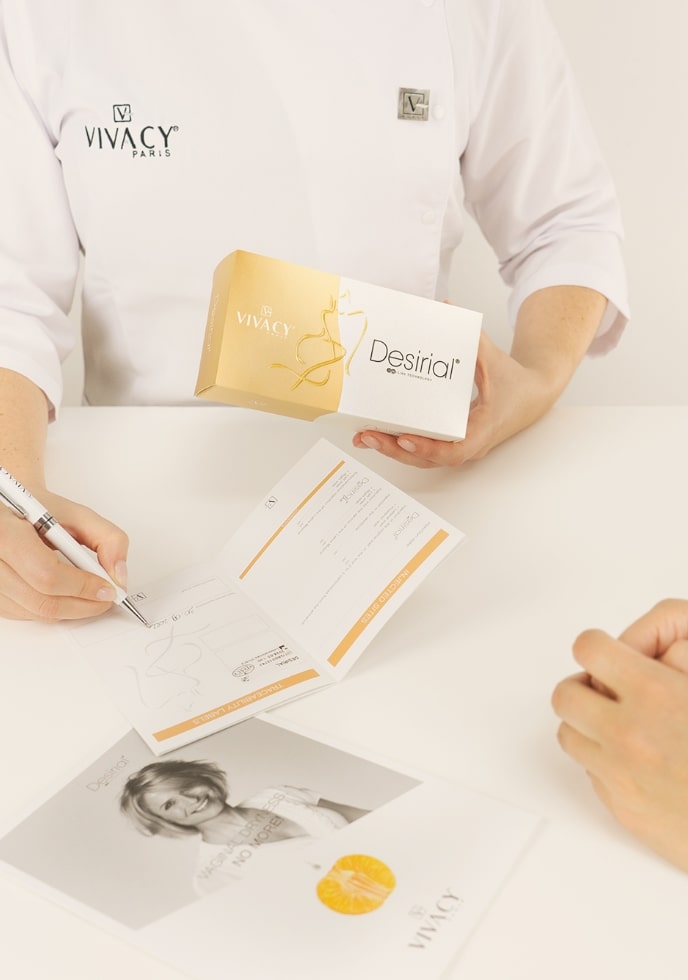INTIMATE DRYNESS:
CAUSES AND SYMPTOMS
INTIMATE CONFORT
What is vulvovaginal atrophy?
ALL YOU NEED TO KNOW ABOUT VAGINAL DRYNESS
Vulvovaginal atrophy (or VVA) is a condition that affects the tissue, resulting in the loss of suppleness and the thinning of the walls of the vagina. It is often accompanied by severe dryness that can cause chronic irritation, a burning sensation, itching and sharp pain during physical activity and sexual intercourse.


What causes intimate dryness?
Vaginal dryness can occur at any age but is particularly common at certain stages in a woman’s life:
DURING AND AFTER MENOPAUSE
Like the rest of a woman’s body, the genitals undergo changes over time, especially during menopause. During this period, the vulvar tissue is particularly affected as oestrogen1, 2 levels decrease. The tissue ages and hardens. Without oestrogen, the vaginal mucosa becomes thinner, dryer and more fragile.
However, vaginal atrophy is not just a problem for menopausal women. This condition, typical of menopause, is also found during breast cancer remission because current treatments block the effects of oestrogen.
AFTER BREAST CANCER TREATMENT
Women who are in remission from breast cancer also suffer from the side effects of hormone therapy, which triggers symptoms of menopause. Rather than experience discomfort, such as vaginal dryness and dyspareunia, some women prefer to forego treatment.3
AFTER CHILDBIRTH
Such changes are not exclusive to older women; young mothers may also experience them after childbirth.4 The oestrogen and progesterone produced by the body fall sharply and remain low for several months during breastfeeding, causing the vaginal mucosa to atrophy.
What are the consequences and the impact of vaginal dryness?
Vaginal dryness can have a huge impact on a woman’s sex life and alter the way in which she perceives her body and her age.
In terms of how women suffering from vulvovaginal dryness perceive themselves, nearly half confirmed they felt frustrated with their body’s change in function. Close to 39% confirmed that they “felt old” and had lost their youthfulness.5
Symptoms of vulvovaginal atrophy (VVA) can trigger pain that may be sharp during sexual intercourse and considerably disrupt a couple’s intimacy. Women derive less pleasure, and the apprehension of pain often leads to some measure of anxiety, causing a lack of lubrication that makes penetration even more difficult… It is a vicious cycle. The result is a lower sex drive, or even total aversion to sexual relations.
The couple’s harmonious relationship is completely disrupted, with the woman feeling frustrated and guilty and the man feeling rejected and often bewildered by this rather sudden lack of sexual interest.
Managing these troublesome sexual effects allows for the better management of other general side effects and the improvement of women’s sex lives.
In terms of sexuality, it has been demonstrated that:
found sexual intercourse uncomfortable or painful5
reduced the frequency of their sexual relations5

Follow us on instagram
1Mac Bride, MB. and al._Vulvovaginal atrophy. Mayo Clin Proc. 2010; 85(1): 87-94.
2Frank, S. M. and al._Vaginal Health: Insights, Views & Attitudes (VIVA) survey – Canadian cohort. Menopause International. 2013; 19(1): 20-27.
3Sabban Serfati, P. Cancer du sein : utilisation de l’acide hyaluronique au niveau de la sphère génitale. Impact sur la compliance des traitements hormonaux adjuvants. Innov Ther Oncol. 2019; 5(4): 202-207.
4Barrett, G. and al._Women’s sexual health after childbirth. BJOG. 2000; 107(2): 186-195.
5Market study conducted by Laboratoires VIVACY: patient survey conducted from December 2021 to January 2022 to assess women’s perception of vaginal dryness, its impacts and treatments, with 3,664 participants aged 40 to 70 years (France), 809 of whom were suffering from vaginal dryness. 46% of women affected by vaginal dryness said that they would be willing to try treatment with DESIRIAL® (EMRT09 – DESIRIAL® patients survey).
